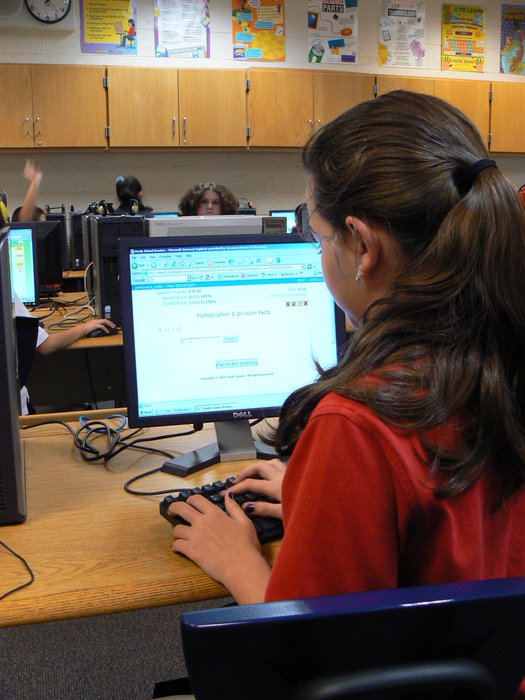At the dawn of the internet age, there was much discussion about a looming “digital divide” that would exist between those who could afford the new technology – desktop computers and internet access – and those who could not.
But in an age when even some homeless people at Journal Square buy prepaid cell phone service, there’s less talk of a digital divide in 2012. Still, according to the Pew Research Center, one in five adults in the U.S. do not use the internet, and increasing numbers of low-income residents only have internet access through a cell phone.
Less than 50 percent of low-income families have internet access through a computer at home.
Computer access, according to a 2008 report from the Federal Reserve, increases graduation rates and reduces truancy and crime among children.
An estimated 20,000 people in Jersey City may be eligible to participate.
____________
Thousands eligible
Comcast’s Internet Essentials program is available to eligible students in any Comcast service area. Through the program, a family can receive a free modem from Comcast and will pay $9.95 a month for internet access. And families who don’t already have computers at home are also eligible to purchase a new or refurbished laptop PC for $150 through the program.
To be considered for the program – which is administered by Comcast, not the Jersey City Public School District – students in a household must be eligible for free or reduced priced meals through the National Student Lunch Program. Also, families cannot have been a Comcast internet subscriber within the last 90 days.
“This isn’t a new program. We’ve actually offered this for a number of years,” said Charles Smith, Comcast’s director of Government Affairs for Northern New Jersey. “The program was available to Jersey City residents last year. What we’re doing a little differently this year is we’re working with the local school district to help us promote the program.”
Smith said there are an estimated 5,000 households, or 20,000 people, in Jersey City who may be eligible to participate in the Internet Essentials Program. Nationally, he said there are currently about 100,000 families receiving internet access through Internet Essentials.
“Prior to this year, only students who were eligible for free meals from the Student Lunch Program were able to participate,” Smith said. “This year, we opened up the program to students that are eligible for reduced price lunches as well.”
Smith said he did not know how many Jersey City residents participated in the program last year. A spokesperson for Comcast refused to provide this information, stating in an e-mail, “As a rule, Comcast doesn’t give out regional numbers of subscribers [for] any of our services.”
Once a family has been accepted into the program, Comcast will install the equipment free of charge.
Families can keep the modem and continue to pay the discounted internet fee for as long as their child remains eligible for free or reduced-price lunches through the School Lunch Program. Families keep the laptops permanently, Smith said.
Households that have an outstanding Comcast bill must pay off their debt before they can be considered for the program.
For more information regarding Internet Essentials through Comcast, call (855) 846-8376 or visit www.internetessentials.com.
E-mail E. Assata Wright at awright@hudsonreporter.com.
SIDEBAR
WiFi free for all?
The Internet Essentials program may go a long way towards narrowing the technology gap in Jersey City. Still, thousands of low-wage residents may be ineligible for the Comcast program but struggling to pay for internet service.
For years, local governments from California to Florida have explored ways to expand internet access for their residents by trying offer free WiFi service. But these efforts have had mixed results due to logistical problems and costs. A number of cities that tried to create WiFi hotspots in their communities several years ago soon abandoned their efforts.
(New York City may be the exception. Under a pilot program currently being tested in New York, 10 pay phone kiosks have been converted to WiFi hotspots. Mayor Michael Bloomberg wants to eventually expand the program to all 12,000 city pay phones.)
Now, a series of grants from the Federal Communications Commission may give Jersey City an opportunity to succeed where other municipalities gave failed. The grants mean that some limited free WiFi service could be available in the city by next summer.
For each of the last two school years, the Jersey City School District has received $1.3 million E-Rate grants from the FCC to expand high speed internet access.
“What we’ve done is we’ve implemented a project where, in addition to doing wireless in all of the schools, we intend to have public wireless access in areas surrounding school buildings so that people can get access to free internet after school hours and on weekends,” said Thomas Purwin, director of technology and information systems for the Jersey City school district. “So, that’s our commitment to try to improve access to the internet for the community.”
Purwin said school buildings should be completely wired for high speed internet access by the end of this year. He expects “about 50 percent’’ of the free public WiFi access to be available by next June. – EAW
